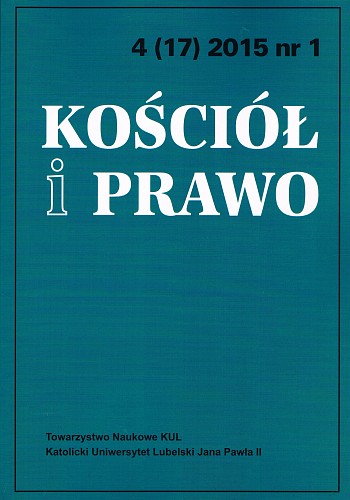Kompetencje administratora diecezji w sytuacji sede vacante dotyczące organów mediacyjnych (kan. 1733 § 2)
Competences of the Diocesan Administrator in the Situation of sede vacante Concerning Mediation Organs (can. 1733 § 2)
Author(s): Agnieszka RomankoSubject(s): Canon Law / Church Law
Published by: Towarzystwo Naukowe KUL & Katolicki Uniwersytet Lubelski Jana Pawła II
Keywords: particular Church; diocesan Bishop; mediation office; mediation council; extraordinary circumstances;
Summary/Abstract: The legislator in the 1983 Code of Canon Law states that the conference of bishops or individual bishops can establish a mediation office or council whose function is to seek and suggest equitable solutions between the author and recipient of an administrative act (can. 1733 § 2). Although the legislator does not determine the possibility of establishing such organs in those particular Churches that are legally on a par with diocese (can. 381 § 2), persons who head the other communities of the faithful – both territorial and personal – can also establish the mediation organs. It should be noticed that the Christian faithful have the right to receive the assistance from the sacred pastors out of the spiritual goods of the Church (can. 213). In the situation of sede vacante, the diocesan administrator is bound by the obligations and enjoys the power of the diocesan bishops, excluding those things which are excepted by their very nature or by the law itself (can. 427 § 1) in accordance with the principle sede vacante nihil innovetur (can. 428 § 1). Thus, there is no legal obstacle for the diocesan administrator, to establish a mediation office or council.
Journal: Kościół i Prawo
- Issue Year: 4/2015
- Issue No: 1
- Page Range: 53-72
- Page Count: 20
- Language: Polish

